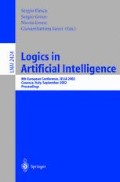Abstract
In this paper, we study minimal and/or conditional answer computing and its related problems. At first, we study some features of minimal answers, and show a non-finiteness property of minimal answers with no function symbols. Next, we show that SOL, which is a modelelimination- like calculus extended with Skip operation, is complete for computing not only correct answers, but also minimal answers. Unfortunately, SOL sometimes produces non-minimal answers. Thus, we next investigate another computational problem of minimal answers.We show undecidability theorems for several membership problems of the minimal answer set, which implies the impossibility of perfectly eliminating nonminimal answers. Finally, we address an extended computation problem, called conditional answer computing. SOL is also complete for computing minimal conditional answers.
This research was supported partly by Grant-in-Aid from The Ministry of Education, Science and Culture of Japan.
Access this chapter
Tax calculation will be finalised at checkout
Purchases are for personal use only
Preview
Unable to display preview. Download preview PDF.
References
P. Baumgartner, U. Furbach and F. Stolzenburg: Computing answers with model elimination, Artificial Intelligence 90 (1997) 135–176.
D. T. Burhans and S. C. Shapiro: Abduction and question answering, Proc. of IJCAI-01 Workshop on Abductive Reasoning (2001).
A. del Val: A new method for consequence finding and compilation in restricted languages, Proc. of AAAI-99 (1999) 259–264.
R. Demolombe: A strategy for the computation of conditional answers, Proc. of ECAI 92, LNAI, 810 (1992) 134–138.
R. Demolombe and L. F. D. Cerro: An inference rule for hypothesis generation, Proc. of IJCAI-91 (1991) 152–157.
C. Green: Theorem proving by resolution as a basis for question-answering systems, in: B. Meltzer and D. Michie (eds), Machine Intelligence 4 (1969) 183–205.
C. Green: Application of theorem proving to problem solving. Proc. of IJCAI-69, (1969) 219–239.
N. Helft, K. Inoue and D. Poole: Query answering in circumscription, Proc. of IJCAI-91 (1991) 426–431.
T. Imielinski: Intelligent query answering in rule based systems, J. Logic Programming 4 (1987) 229–257.
K. Inoue: Linear resolution for consequence finding, Artificial Intelligence 56 (1992) 301–353.
K. Inoue: Induction, abduction, and consequence-finding, Inductive Logic Programming: Proc. of the 11th ILP, LNAI 2157 (2001) 65–79.
K. Iwanuma: Lemma matching for a PTTP-based top-down theorem prover, Proc. of CADE-14, LNAI 1249 (1997) 146–160.
K. Iwanuma, K. Inoue and K. Satoh: Completeness of pruning methods for consequence finding procedure SOL, Proc. of FTP 2000 (2000) 89–100.
K. Kunen: The semantics of Answer Literals, J. Automated Reasoning 17 (1996) 83–95.
R. Letz: Clausal tableaux, in: W. Bibel, P. H. Schmitt, eds., Automated Deduction. A basis for applications, Vol. 1, (Kluwer, 1998) 39–68.
J. Lobo, J. Minker and A. Rajasekar: Foundations of Disjunctive Logic Programming (MIT Press, 1992).
D. W. Loveland: Automated Theorem Proving: A Logical Basis (North-Holland, Amsterdam, 1978).
P. Marquis: Extending abduction from propositional to first-order logic, Proc. of Inter. WS. on Fundamentals of Artificial Intelligent Research, LNAI 535 (1991) 141–155.
S-H. Nienhuys-Cheng and R. de Wolf: Foundations of Inductive Logic Programming, LNAI 1228 (1997).
P. Siegel: Représentation et utilization de la connaissance en calcul propositionnel, Thèse d’État, Université d’Aix-Marseille II, Luminy, France, 1987 (in French).
R. E. Shostak: Refutation graphs, Artificial Intelligence 7 (1976) 51–64.
M. E. Stickel: A prolog technology theorem prover: Implementation by an extended prolog compiler, J. Automated Reasoning 4 (1988) 353–380.
H. Tamaki and T. Sato: OLD Resolution with tabulation, Proc. the 4th ICLP, (1986) 74–103.
Author information
Authors and Affiliations
Editor information
Editors and Affiliations
Rights and permissions
Copyright information
© 2002 Springer-Verlag Berlin Heidelberg
About this paper
Cite this paper
Iwanuma, K., Inoue, K. (2002). Minimal Answer Computation and SOL. In: Flesca, S., Greco, S., Ianni, G., Leone, N. (eds) Logics in Artificial Intelligence. JELIA 2002. Lecture Notes in Computer Science(), vol 2424. Springer, Berlin, Heidelberg. https://doi.org/10.1007/3-540-45757-7_21
Download citation
DOI: https://doi.org/10.1007/3-540-45757-7_21
Published:
Publisher Name: Springer, Berlin, Heidelberg
Print ISBN: 978-3-540-44190-8
Online ISBN: 978-3-540-45757-2
eBook Packages: Springer Book Archive

